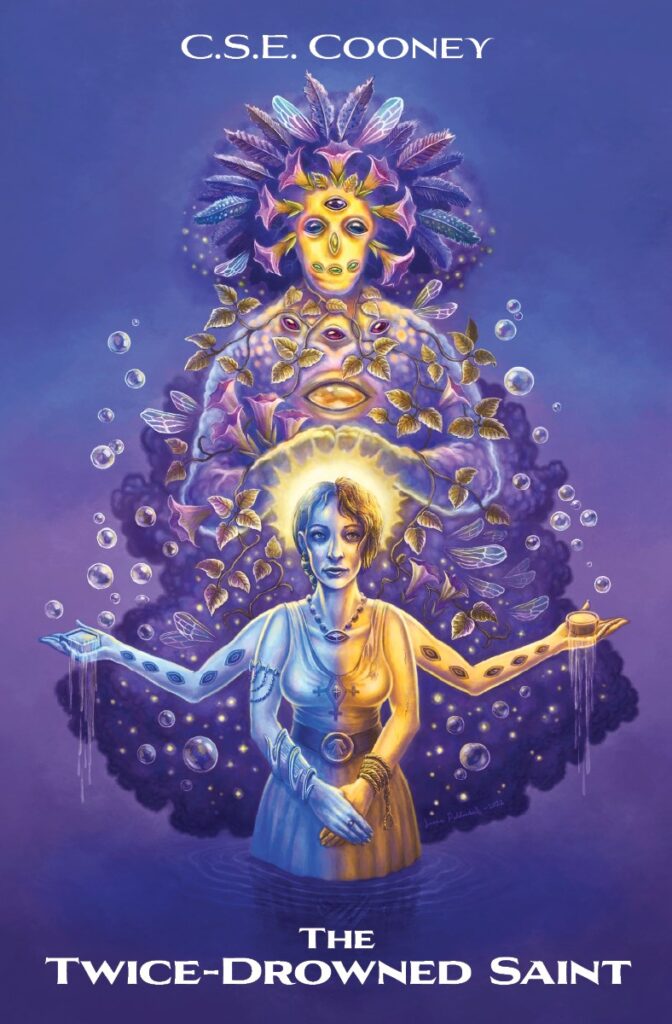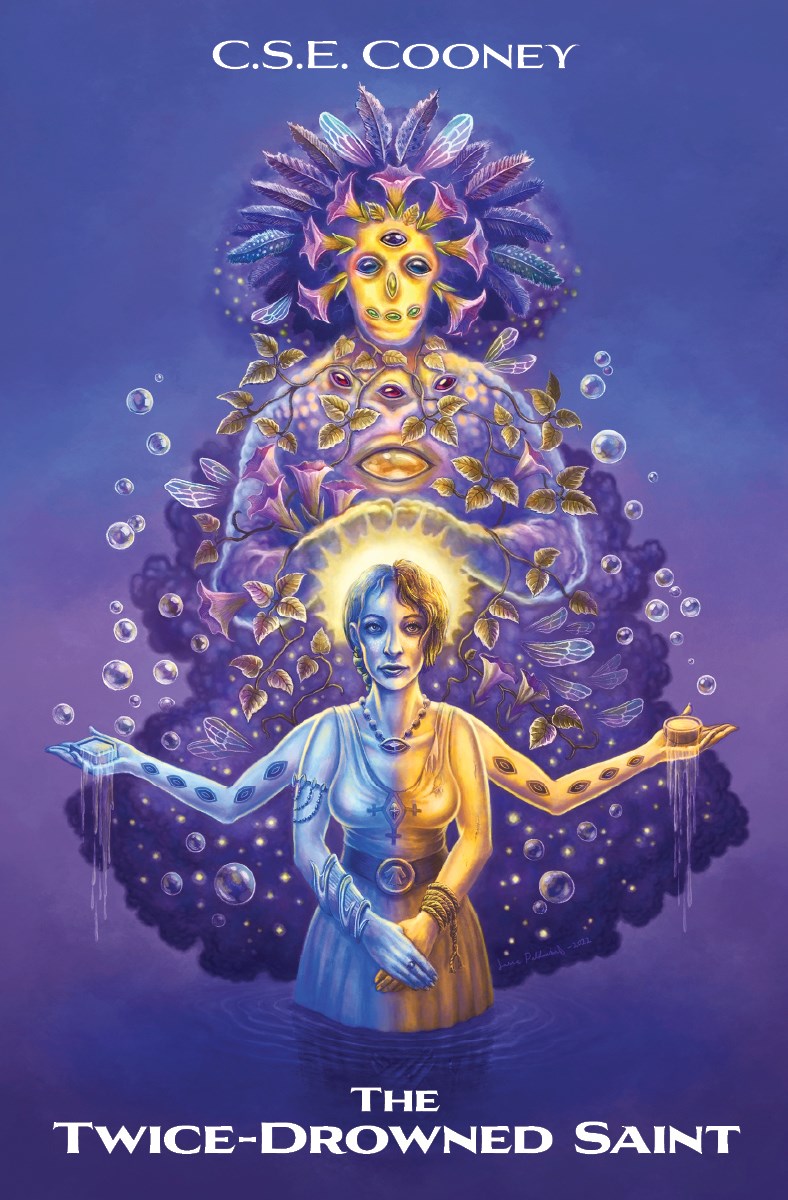
Genres: Fantasy
Representation: Minor nonbinary character, minor M/M
PoV: First-person, past-tense
Published on: 7th February 2023
ISBN: B0BKJZBJY2
Goodreads

"World Fantasy Award winner Cooney imagines angels as Lovecraftian monsters . . . Plenty of charm!"
—Publishers Weekly"Many have spoken about how angels can be both terrifying yet beautiful, but few have successfully captured the idea well-until The Twice-Drowned Saint, at least. A sumptuous, saw-toothed read, it is a jewel box of a novel, glittering with a thousand details and a bright longing we're all familiar with, this want for a place better than we're in now."
—Cassandra Khaw, Bram Stoker and World Fantasy award-nominated author of Nothing but Blackened TeethWorld Fantasy Award winner C. S. E. Cooney takes readers on a journey of wonder, terror, and joy in this mind-bending, heartfelt novel. Contained inside impassable walls of ice, the city of Gelethel endures under the rule of fourteen angels, who provide for all their subject's needs and mete out grisly punishments for blasphemous infractions, with escape attempts one of the worst possible sins.
"Our narrator is Ishtu Q'Aleth (Ish for short), the new owner of Gelethel's only cinema (having taken over from her father). More importantly, she's also the secret saint of Alizar the Eleven-Eyed, Seventh Angel of Gelethel, and one of the fourteen angels who holds dominion over the city. As Ish explains it, at the age of eight she turned down Alizar's offer to be his saint, but, in a moment that speaks to the novel's charm, the young girl and the all-knowing angel agreed to continue their relationship in secret after bonding over their shared love of cinema. Near thirty years later Ish is desperate to get her sick parents out of the city, a near-impossible task given Gelethel is surrounded by an impenetrable blue serac. But Ish's situation grows even more complicated when a new arrival to the city, a girl named Betony, appears as Alizar's true saint. There's so much to adore about the The Twice-Drowned Saint ... [a] sublime short novel."
—Locus"With The Twice-Drowned Saint, C. S. E. Cooney once again crafts dazzling feats of imagination grounded in human frailties and plunges her audience inside head-first. Her boldly unique characters live in a fever dream of balletic, graceful description that will make you gasp, even as they find their own escape through the seemingly-mundane world of movies. Like nothing else you've ever read, or will ever read."
—Randee Dawn, author of Tune in Tomorrow"Fabulous Gelethel is a city of godless angels who intoxicate themselves on human death, but within its icy walls a hidden saint and a dissident angel are hatching a plan. This story left me wrecked and rebuilt: it's a truly glorious tale of family bonds, forgiveness, sacrifice, courage ... and how gods are born. Written with Cooney's signature soaring prose, humor, and imagination, this tale shines a light on cruelties both fantastical and familiar. It honors sorrow and embraces joy-I will treasure it always"
—Francesca Forrest, author of The Inconvenient God"The way Cooney does world building, she makes the world absolutely gigantic, and then she focuses the lens onto these intimate moments in people's lives . . . My clumsy words don't do justice to The Twice Drowned Saint. Just read it. It is a sunrise, where all things are beautiful and possible, and it is blood on the ground surrounded by those who lap it up, hungering for more. This is one of the best pieces of fiction I've read this year."
—Little Red ReviewerCover art, cover design and interior black and white illustrations by Lasse Paldanius.
I received this book for free from the publisher via Edelweiss in exchange for an honest review. This does not affect my opinion of the book or the content of my review.
Highlights
~38yo MC with 38yo knees
~undercover saints
~the police are possessed (no, literally)
~angels: “BE AFRAID.”
~the waste collectors are a crime family
~holy popcorn
I was so determined to write this book a review that did it justice, I actually ended up reading it twice – once over a period of weeks; the second time, I gulped the whole thing down in a single day.
I REGRET NOTHING.
For real, though: this is a book that lost none of its lustre on a reread, which is a noteworthy accomplishment all by itself. I wasn’t bored for a moment, even when I knew exactly how everything was going to go down; I still felt all the Feels; I still got thrill-shivers at the breathcatching parts. I still loved getting to see an older (‘older’; 38 isn’t actually old, but you know what I mean) protagonist who is equal parts cynical and hopeful, snarky and smart; I was still gleeful over the system of holy benisons-as-currency; I still adored Betony, from her platinum crown to her dusty feet. I still wanted to watch movies at the Quick and wander beautiful, fruitful Bloom and take a peek at what books a public library in a city ruled by angels might hold.
But.
Cooney routinely leaves me speechless, and The Twice-Drowned Saint is no exception – despite having read it twice, I have no idea how to describe, never mind explain, this brilliantly, beautifully bizarre little novel, with its properly unbiblical angels, a possessed police-force, and a sacred cinema of silent, black-and-white movies! What am I supposed to say???
I loved it. Obviously.
I was not completely sure I would, at first! I dove in as excited as I could possibly be, but I was not expecting first-person narration, and was a bit disappointed, since first-person makes it hard to justify the gleefully ostentatious syntactical and lexical extravaganza that is Cooney’s prose in third-person. But I shouldn’t have doubted her; she’s established in multiple short stories that her first-person writing still glitters and gleams and glitzes, and so it does here in The Twice-Drowned Saint. In fact, I might actually recommend this as a good place to start if you’ve never read Cooney before and are wary of the purple prose (a term I use not derogatorily but with love) that I’ve raved about in her other books, because here, the dial’s turned down on the logophilia, but the story still sizzles and sears with Cooney’s signature quixotic whimsy and vivid, fantastical weirdness.
There were two things every Gelthic citizen knew.
One: only saints could see the angels who ruled us.
Two: Alizar the Eleven-Eyed, Seventh Angel of Gelethel, had no saint. He hadn’t had one for a long time.
Now I will tell you what the angel Alizar looks like.
Neither of which would shine quite so brightly seen through the eyes of a lesser narrator, but Ishtu Q’Aleth is a main character whose personality and voice are every bit as uniquely distinct – and perfect for the story she’s telling – as were Maurice’s of The Bone Swans of Amandale or Mar’s of The Witch in the Almond Tree (short stories that can be found in Bone Swans and The Witch in the Almond Tree: and other stories respectively). But rather than being a shapeshifter (Maurice) or a witch (Mar), Ishtu is a little bit of both; a saint hiding in plain sight, having refused the call to serve the angel Alizar – at least, in the traditional way.
I was the Seventh Angel’s best kept secret.
And he was mine.
Instead, she and Alizar are secret besties, while Ishtu runs the only cinema in a literal city of angels and Alizar does his best to mitigate the bloodthirstiness of his peers, the rest of the angels who rule over Gelethel, a rhombus-shaped city surrounded by a ginormous wall of ice in the middle of the desert.
Oh, and there’s holy popcorn.
Are you intrigued yet?
There’s so much to love here – silent movies so lovingly described I wish I could watch them for myself; a crime family that is also a charity family; attention to detail that goes right down to Gelethel’s very unique currency; and of course, the thing I was most excited about going into this book: Cooney’s take on angels. As someone ardently following #biblicallyaccurateangels on every platform that lets you track hashtags, I loved the angels of The Twice-Drowned Saint, because although Gelethel’s angels are not made of wheels and fire, Cooney has absolutely captured the vibe of Eerie Alien Otherness, the visceral feel of terror-glory-horror-awe that imbues old-school angels, and channelled it through her own aesthetic.
The angel Alizar sometimes looked like a human-shaped paper lantern, or a sudden release of soap bubbles, or a cloud. He glowed on the inside as if he’d swallowed a hive of horny fireflies, and on the outside, he looked as if a toddler with a glue gun had gone wild with the craft buckets containing outrageous feathers, and twining golden vines, and trumpet-like lowers, and thin, prismatic insect wings.
Superficially, The Twice-Drowned Saint is about how 38yo Ishtu (I’m still so delighted to see an MC who is neither a teen nor in her 20s!) wants out of Gelethel – which is completely forbidden – to get her ailing parents the medical care they need in some other city (angels, apparently, not being fans of public health care). Due to belonging to what I can only call a charitable crime family, Ishtu and her parents could sneak out – but Ishtu doesn’t feel she can abandon Alizar, who is the least of the angels who rule the city, bullied by the rest.
So it’s a good thing another saint of his appears to get the story rolling.
Because really, The Twice-Drowned Saint is a book about a revolution, a massive subversion of our typical assumptions about strength and power, about the rewards of violence versus the rewards of open hands and open hearts.
“That ain’t weakness, Q’Aleth. Weakness is killin’ someone for their bread. Strength is splittin’ your last loaf with them.
It’s about many different kinds of faith, and the treatment of refugees and immigrants, about the hoarding of resources when there’s plenty to go around. It’s about movie-making and storytelling and upending the status quo.
Of course, the poets and the outlaws won against him in the end. That’s what they did, in movies. Maybe the only place they ever did.
And that’s why we need movies, Uncle Eril had once told me. That’s why it was such a great good thing–the day your father came to Gelethel.
Which is not to say that this is a preachy book bluntly bleating Moral Lessons at you; instead it’s scintillatingly electric, twisty and rich, fierce and gentle and sizzling. This is a book that bats its eyelashes at you and invites you in, then pours a cocktail of invisible wonders and sheer heart-full humanness down your throat; it’s sitting down in a theatre to a black-and-white silent movie and being blasted with sparkling jewel-tones and a full orchestral soundtrack instead. It always feels a little tongue-in-cheek, as though the story is giving you a wink and letting you in on the joke, even as it takes itself seriously with punctilious care.
Which, yes, sounds like a contradiction, DO YOU SEE WHY I’M HAVING TROUBLE EXPLAINING IT???
It’s so weird! It’s so wonderful! It is such a big glorious story somehow distilled into a powerfully short novel, and I am not doing it justice at all, but please believe me when I tell you it is marvellous.
As in, excellent.
As in, full of marvels and miracles.
Alizar the Eleven-Eyed was waiting there to welcome me.
He was there, in the firmament, in the clusters of star-like eyes and the spaces between them. He was also all around me, sitting in my bones: jewel-flame flower bells, feathering ferns, the fluttering of membranous wings, a warm and golden thing, like a lamp filled with fireflies.
Do I have any critiques? Sure, but they’re extremely minor; I found it a little too easy/obvious that Alizar, the one good angel, is also the only angel who is aesthetically pretty – the others we see are all quite horrifying and monstrous. And although the grand finale was appropriately goosebump-giving, I didn’t understand why A Certain Thing was necessary – even on my second read, I didn’t catch any explanation or follow the reasoning.
You know, you gonna be a poet, you gotta get yourself some ink. In the real world, poets are head-to-toe tattoos. ‘War flowers,’ we used to call ’em, in Rok Moris.
But I really don’t care, because literally everything else is freaking EPIC. The surreal, wildly imaginative setting and worldbuilding; the pretty incredible complexity of each member of the cast and their relationships to each other (the uncles!!!)(no for real though THE UNCLES!!!); the frankly ridiculous number of times this book took me by surprise – both in terms of big plot twists and itsy-bitsy details–
And, of course, Ishtu herself.
He was like a cricket some kid had poured diatomite over. He was a murderer. A fanatic for the angels. Worse, a teenager.
Oh, Ishtu. *happy sigh*
In short? Yes, I loved it. Obviously. And I will be reading it again – not least because I caught two Easter Egg nods to Saint Death’s Daughter and Bone Swans, and am sure there are more that I missed!
You can visit Gelethel for yourself on the 7th of Feb – next week! – and I MIGHTILY encourage you to do so!







Leave a Reply